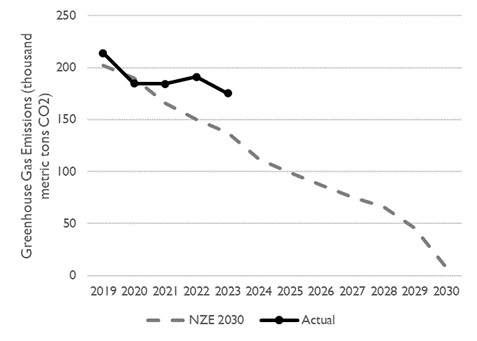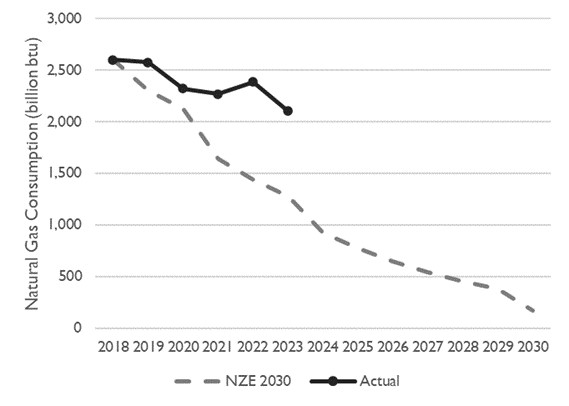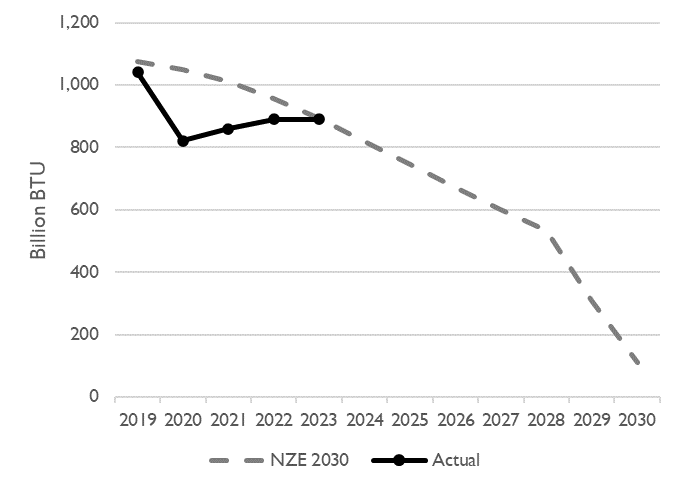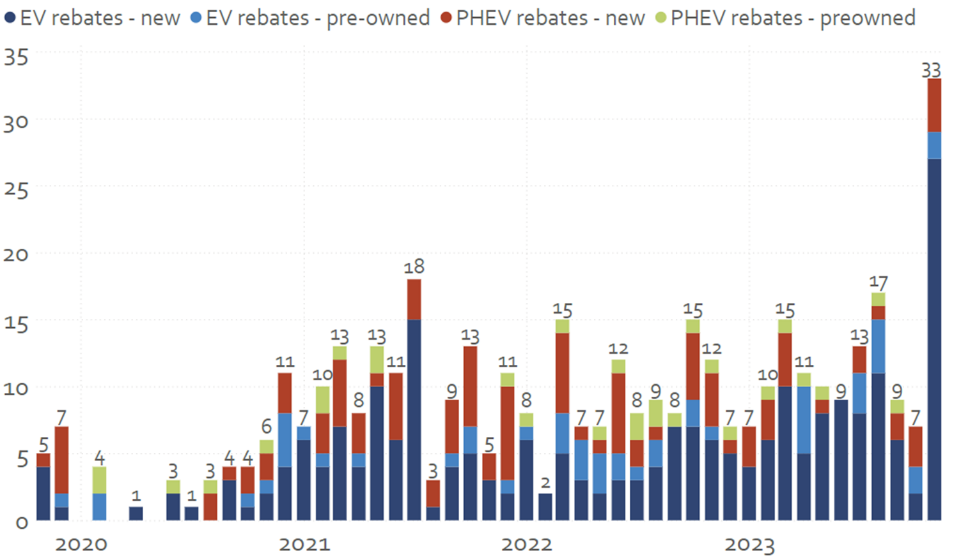Mayor Weinberger and Burlington Electric Announce Major Progress in Annual Net Zero Energy Roadmap Update, and New Electrification Incentives and Programs for 2024
Fossil Fuel Use in the Building Sector Down 19 percent with more than 2,300 heat pumps installed since 2018; New Electrification Incentives and Programs will Save Burlingtonians Money
 Burlington, VT – Today, Mayor Miro Weinberger and Burlington Electric Department (BED) shared Burlington’s Net Zero Energy (NZE) Roadmap update for 2023 and announced exciting new programs and incentives to accelerate electrification. The update shows a significant overall decline of 18.2 percent in greenhouse gas emissions in the ground transportation and thermal sectors from 2018 to 2023, marking the second largest year-over-year drop in that period. The greatest change was in the building sector, with a 19 percent reduction in fossil fuel use since 2018.
Burlington, VT – Today, Mayor Miro Weinberger and Burlington Electric Department (BED) shared Burlington’s Net Zero Energy (NZE) Roadmap update for 2023 and announced exciting new programs and incentives to accelerate electrification. The update shows a significant overall decline of 18.2 percent in greenhouse gas emissions in the ground transportation and thermal sectors from 2018 to 2023, marking the second largest year-over-year drop in that period. The greatest change was in the building sector, with a 19 percent reduction in fossil fuel use since 2018.
“It has been five years since we announced the most ambitious climate policy of any City in America, our Net Zero Energy Road Map. Today’s report demonstrates that with pioneering policy and collective action across the community we can end our reliance on fossil fuels and save Vermont families and businesses money at the same time,” said Mayor Miro Weinberger. “This proves that that real climate progress is achievable for our City and State, and I look forward to seeing the positive impacts that the programs we are announcing today will have for Burlington in the future.”
While in 2022 the City saw some post-pandemic rebound in fossil fuel use in buildings, the 2023 update marks a continuation of the broader trend toward emissions reduction. Natural gas consumption (not weather normalized) in 2023 was at its lowest point since NZE Roadmap tracking began with 2018 baseline data. Importantly, this update analyzes emissions through the end of 2023, and does not include impacts from Burlington’s recently enacted Carbon Pollution Impact Fee Ordinance or anticipated Vermont State rebates from the Inflation Reduction Act, which will drive further reductions in fossil fuel use.
“The Burlington Electric team is excited about the progress our City is making on our ambitious Net Zero Energy Roadmap goals, including the more than 18 percent reduction in greenhouse gas emissions in buildings and ground transportation between 2018 and 2023,” said Darren Springer, General Manager of BED. “Some of the most recent actions our City has taken, including the enactment of the Carbon Pollution Impact Fee Ordinance, which just took effect in 2024, will help further reduce fossil fuel use and greenhouse gas emissions in the coming years. With more work necessary to accelerate progress toward our climate goals, today we are announcing a number of new programs and incentives, including the first-in-the-nation utility ‘superuser’ incentive to help reduce gasoline consumption among drivers who put the most miles on their vehicles. We also are pleased to announce the Switch and Save program to help income-qualified customers switch from fossil fuel to heat pump water heaters, and the new heat pump bill credit pilot program to help customers save money on operating a heat pump, while enabling peak energy use reductions that benefit all customers.”
Decline in Greenhouse Gas Emissions from Ground Transportation and Thermal Sectors
Greenhouse gas emissions in the ground transportation and thermal sectors declined 18.2 percent in total, to 175,410 metric tons of CO2 equivalent in 2023 compared to 214,568 metric tons in 2018. Natural Gas consumption in the building sector is down 19 percent while emissions from transportation remain below Roadmap targets, while new housing production is up 400% in Burlington since 2012.



The reductions in fossil fuel consumption can be attributed, in part, to the growing suite Net Zero Energy incentives offered by BED. Burlington has made significant progress on installing heat pumps, with over 2,300 installed in the City since the launch of the NZE Roadmap in September 2019, and a 25x participation increase in BED’s Tier 3 heat pump rebate program, which largely serves residential customers. Since launching its EV rebate program in 2017, BED has helped 721 Burlingtonians switch to electric or plug-in hybrid vehicles, with over 20 percent of the rebates going to income-qualified customers. The Roadmap update shows there were 829 electric or plug-in hybrid vehicles registered in Burlington as of the end of 2023.
Mayor Weinberger and BED announced significant set of new incentives and programs to accelerate progress toward Net Zero Energy during 2024 and beyond. New actions targeted at reducing emissions from the transportation sector include the new Super User Incentives, as well as improved electric bike, electric vehicle (EV) charging, and electric bus rebates. Two new programs, Switch and Save and a Heat Pump Bill Credit Pilot, are aimed at reducing thermal sector emissions in the future.

Superuser Incentive, E-Bike, EV Charging, and E-Bus Rebates
In 2023, BED specifically was authorized by the Vermont Legislature in Act 44 to develop a new, first-of-its-kind utility incentive to help drivers who drive the most miles switch to EVs and reduce their carbon footprint while saving on fuel costs. BED now is launching its “superuser” incentive, which provides up to $500 in rebates for qualified customers in addition to BED’s existing EV incentives, which now are up to $3,000. “Superuser” program rebates will provide an additional $250 for drivers who travel 17,700 miles annually (approximately double the Burlington average), and $500 for drivers who travel 25,300 miles annually (approximately triple the Burlington average).
The updated 2024 BED rebates also include:
- Increased E-bike rebate from $200 to $300;
- Increased workplace/retail Level 2 EV charger rebate from $2,000 to $2,500;
- New Level 2 EV charger rebate for workplace/retail locations in Justice40 locations of $3,250 (the Federal government has made it a goal that 40 percent of overall benefits, including certain climate and clean energy investments, flow to disadvantaged communities);
- Increased workplace Level 3 EV fast charger rebate from $10,000 to $15,000;
- Ride-share and delivery driver rebates for switching to an EV, ranging from $250 to $500; and
- Expected rebates for additional E-buses to support electric public transit.
“The data is clear that helping Vermonters who must drive the most get into EVs is an essential component of easing energy burdens and cutting carbon pollution as much as possible,” said Ben Edgerly Walsh, climate and energy program director with VPIRG. “The kinds of incentives Burlington is rolling out today should be available in every corner of the country – certainly in every corner of Vermont – and we deeply appreciate Burlington’s willingness to do more for its residents and the climate without waiting for others to go first.”
“We applaud Mayor Weinberger, GM Darren Springer, and the team at Burlington Electric for adopting an incentive plan to help gasoline-burdened drivers who use more gasoline make the switch to EVs,” said Rob Sargent, Coltura Policy Director. “Electric utilities play a critical role in the shift away from fossil fuels used for transportation. We’re confident this first in the nation “Superuser” policy will be replicated across the country.”
Switch and Save Program
The Switch and Save program will help income-qualified customers switch from a fossil fuel or a less efficient electric water heater to a new heat pump water heater, saving money and reducing energy use. BED is working with affordable housing providers, including Champlain Housing Trust (CHT), to implement the program. Initially, BED will receive $400,000 from the state to support implementation, with potential for additional funds in the future. BED expects to help between 75 and 125 residential, income-qualified customers make the switch. Low-income households will receive 100 percent up to $5,000 of the installed costs of a new heat pump water heater, and moderate-income households will receive 90 percent up to $4,500. The statewide Switch and Save program is being administered by Efficiency Vermont.
Amy Demetrowitz, CHT Chief Operating Officer, said: “Champlain Housing Trust is always looking for ways to engage in programs that improve equity, and initiatives like Switch and Save exemplify our commitment to ensuring that all members of our community have access to sustainable and affordable energy solutions.”
“This technology is one of the best ways Vermonters can switch to a more efficient system for their home’s hot water needs,” said Peter Walke, Managing Director of Efficiency Vermont. “As this enhanced heat pump water heater offer becomes widely available in the coming weeks, more Vermonters will be able to consider this efficient and climate-friendly equipment.”
Heat Pump Bill Credit Pilot Program
BED was selected under the federal Grid Resilience and Innovation Partnership (GRIP) competitive grant program for more than $1 million in funds that could support the heat pump bill credit pilot program device procurement, and other demand response initiatives, pending completion of necessary grant agreements and approvals.
The proposed program would create a new heat pump bill credit pilot program to provide participating customers with ductless mini-split heat pumps, which presents an opportunity to save on costs while helping BED reduce peak energy use.
New Public EV Chargers
A new Level 3 public fast charger soon will be available at the City’s Marketplace Garage, marking the second installation of a modern fast charger under BED’s Net Zero Energy Revenue Bond (the first is located at BED’s 585 Pine Street offices). Pending consideration by the Public Works Commission, BED plans to utilize a state grant to support installation of five new pole-mounted Level 2 EV chargers that can serve on-street parking spaces in areas of the City.
Five Years of Net Zero Energy Progress
With September 2024 marking the five-year anniversary of the launch of the Net Zero Energy Roadmap, the Mayor and BED also highlighted key actions and initiatives that have been adopted in Burlington with City Council and community support, including:
- Enacting rental weatherization standards;
- Enacting the primary renewable heating ordinance in 2021;
- Passing a Charter Change to provide Burlington unique municipal authority to take actions to reduce greenhouse gas emissions in buildings;
- Enacting a first-of-its-kind in Vermont Carbon Impact Pollution Fee Ordinance for new construction and large existing buildings, making Burlington of the first city of its size and in a cold climate to enact a carbon fee;
- Electrifying the City vehicle fleet, including new vehicles, trucks, lawn equipment, and BED’s first-in-Vermont electric bucket truck for its line crew;
- Implementing and improving dozens of consumer incentive programs for electrification across all modes of transportation and for buildings;
- Partnering with VHFA to offer on-bill financing for income-qualified residents and renters to invest in weatherization and heat pumps;
- Developing the first-of-its-kind Net Zero Energy Revenue Bond, with investment in new modern EV fast chargers, grid infrastructure, and technology systems to enable innovative rate and program design;
- Partnering with CarShare Vermont to support more CarShare EVs and PHEVs, as well as charging parking spaces;
- Implementing the BED Energy Assistance Program to provide a 12.5 percent electric bill discount to income-qualified customers;
- Establishing BED’s EV rate, which provides residential customers the opportunity to charge EVs off-peak for the equivalent of approximately 75 cents per gallon of gasoline; and
- Working on the District Energy System that will improve efficiency at the McNeil Generating Station and reduce reliance on natural gas in the commercial sector by approximately 16 percent in Burlington.


